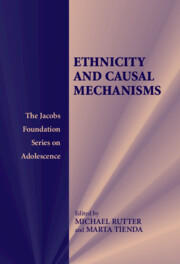Book contents
- Frontmatter
- Contents
- List of Contributors
- Foreword
- Preface
- 1 Natural Experiments, Causal Influences, and Policy Development
- 2 Growing Up Ethnic in the United Kingdom and the United States: Comparative Contexts for Youth Development
- 3 The Multiple Facets of Ethnicity
- 4 Educational Attainments: Ethnic Differences in the United Kingdom
- 5 Race and Ethnic Inequality in Educational Attainment in the United States
- 6 Racial and Ethnic Disparities in Crime and Delinquency in the United States
- 7 Explaining Ethnic Variations in Crime and Antisocial Behavior in the United Kingdom
- 8 Cultural Differences in the Effects of Physical Punishment
- 9 Ethnicity and Mental Health: The Example of Schizophrenia in the African-Caribbean Population in Europe
- 10 Ethnic Variations in Youth Suicide
- 11 Ethnicity and Intergenerational Identities and Adaptations in Britain: The Socio-Political Context
- 12 Assimilation, Dissimilation, and Ethnic Identities: The Experience of Children of Immigrants in the United States
- 13 Deciphering Ethnicity: Reflections on Research Opportunities
- Author Index
- Subject Index
9 - Ethnicity and Mental Health: The Example of Schizophrenia in the African-Caribbean Population in Europe
Published online by Cambridge University Press: 05 July 2014
- Frontmatter
- Contents
- List of Contributors
- Foreword
- Preface
- 1 Natural Experiments, Causal Influences, and Policy Development
- 2 Growing Up Ethnic in the United Kingdom and the United States: Comparative Contexts for Youth Development
- 3 The Multiple Facets of Ethnicity
- 4 Educational Attainments: Ethnic Differences in the United Kingdom
- 5 Race and Ethnic Inequality in Educational Attainment in the United States
- 6 Racial and Ethnic Disparities in Crime and Delinquency in the United States
- 7 Explaining Ethnic Variations in Crime and Antisocial Behavior in the United Kingdom
- 8 Cultural Differences in the Effects of Physical Punishment
- 9 Ethnicity and Mental Health: The Example of Schizophrenia in the African-Caribbean Population in Europe
- 10 Ethnic Variations in Youth Suicide
- 11 Ethnicity and Intergenerational Identities and Adaptations in Britain: The Socio-Political Context
- 12 Assimilation, Dissimilation, and Ethnic Identities: The Experience of Children of Immigrants in the United States
- 13 Deciphering Ethnicity: Reflections on Research Opportunities
- Author Index
- Subject Index
Summary
Introduction
The relatively common occurrence of schizophrenia in African-Caribbean populations living in Europe is used in this chapter as a model to discuss relationships among ethnicity, migration, and mental health. The phenomenon will be described, and possible causes will be discussed in the context of the theoretical framework that underpins the migration paradigm, set out by Rutter in Chapter 1.
Ødegaard (1932) was the first to moot the idea that certain migrant groups may be susceptible to schizophrenia in the years following their journey. He noted the phenomenon in Norwegian migrants to the Midwest of the United States in the early years of the 20th century. Studies in the United Kingdom began to report a much higher than expected incidence of schizophrenia in this group soon after their arrival in the 1950s and first half of the 1960s. Initial reports were confirmed and explored in a series of progressively more rigorous and sophisticated studies that will be reviewed in what follows (Hemsi, 1967; Kiev, 1965).
The schizophrenia incidence rate appears to be elevated 5- to 10-fold compared with the general population. Such an effect is almost as large as the association between smoking and lung cancer, something that, 30 years earlier, revolutionized understanding of the causes of that disease and paved the way for major and extant public health initiatives the world over. However, the schizophrenia and ethnicity association remains contentious and unexplained.
- Type
- Chapter
- Information
- Ethnicity and Causal Mechanisms , pp. 227 - 261Publisher: Cambridge University PressPrint publication year: 2005
- 7
- Cited by



